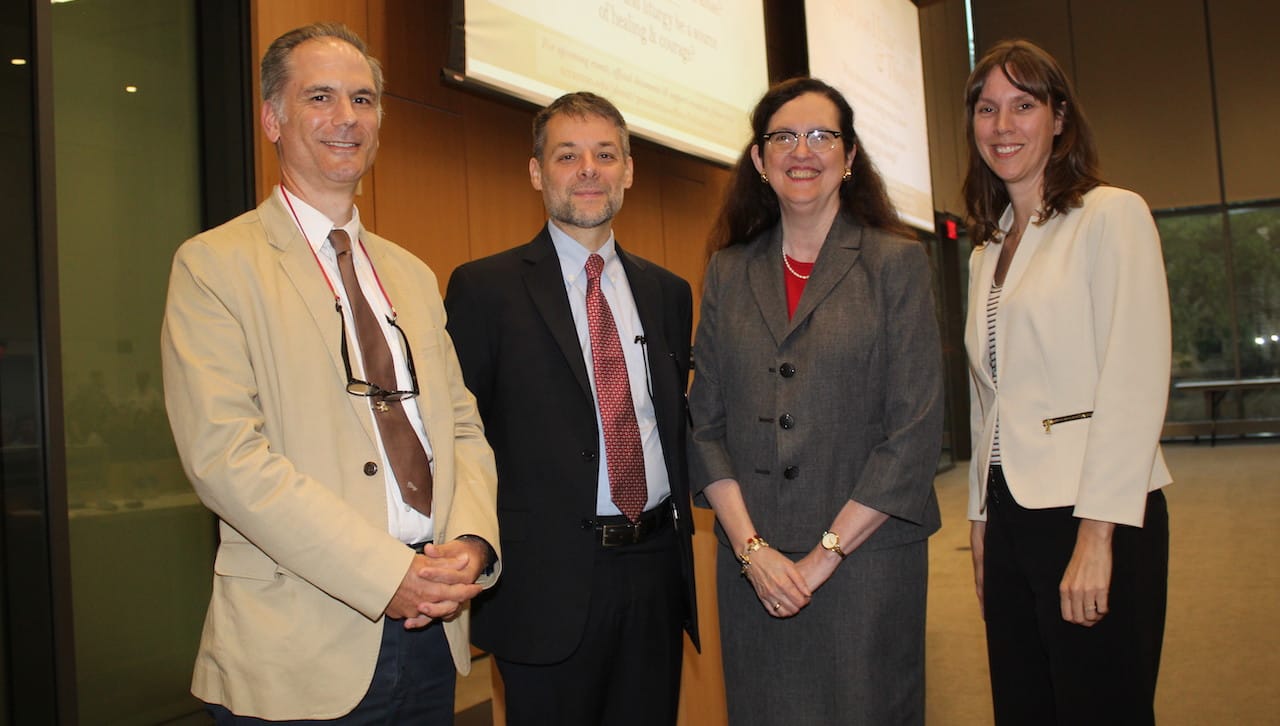Historical and Theological View of Church Crisis

At the first Task Force for Healing, Reconciliation and Hope event of the fall 2019 academic semester, Massimo Faggioli, Ph.D., professor of theology at Villanova University, and Rita Ferrone, contributing writer at Commonweal magazine, presented “Insights from History and Theology,” a forum addressing questions surfaced by the crisis of Catholic clergy sexual abuse.
Dr. Faggioli’s lecture addressed what church history teaches the world about this crisis, and presented what he said were sensitive issues that spoke to changes the crisis is bringing in the church and in society.
Dr. Faggioli reported that 20-25 percent of clergy from the 16th and 17th centuries had a criminal record, yet the Holy Office burned archival records of priest investigations every 10 years or less until 1914, which Faggioli referred to as bonfires.
“Our problem is that we don’t know when they stopped burning records. So, Catholic institutions of higher education have been slow in reacting to this and doing something,” Dr. Faggioli said.
Dr. Faggioli identified five issues pressing the church and the world following the abuse crisis, including the statement that the church cannot heal entirely by itself. Faggioli said the church must address the crisis with the rest of the world yet still glean its own theological truth apart from judicial and journalistic views.
“The monster we see in the mirror as Catholics is not a picture that can be changed by a court. It is work that intellectuals and theologians have to do. I’m not accusing anyone. I’m part of the problem,” Dr. Faggioli said.
Ferrone’s presentation addressed whether prayer and liturgy can be a source of healing and courage for those affected by the church’s abuse. Ferrone said sometimes members of the Catholic church are tempted to feel helpless in terms of beating the crisis, due to its unprecedented nature, but Catholics can still see and embrace God’s work.
“I may have already tested your credulity by saying that God is at work in and through this crisis, but that’s the wager. That’s the bet,” Ferrone said.
Ferrone discussed Luke 17:2, which states “It would be better for them to be thrown into the sea with a millstone tied around their neck than to cause one of these little ones to stumble.” Ferrone said the passage makes her tremble at the thought of how many children have faced abuse from the Catholic church.
Ferrone spoke about what Pope Francis calls the Jonah Syndrome, which is the false solution of finding a scapegoat on which to pin a problem. Ferrone named several scapegoats blamed for the sex abuse crisis, but said members of the Catholic church should listen to the hard truths not as cynics, but with an open heart.
“Francis told (Archbishop of Grenada, Francisco Javier Martínez Fernández) to ‘come down from the cross and face up to the problems in [his] dioceses,’” Ferrone said.
Ferrone said that the only adequate response to the church’s crisis is a Paschal Response, involving the death of an old model of insularity and arrogance.
“Instead, we turn to an organic, sacramental relationship of sharing in the one mission of the church for which we must all hold one another accountable, and which is worked out in all our various roles and relationships,” Ferrone said.
Dr. Faggioli and Ferrone then responded to questions from audience members following their presentations in the Kane Forum of Leahy Hall on Sept. 16.







